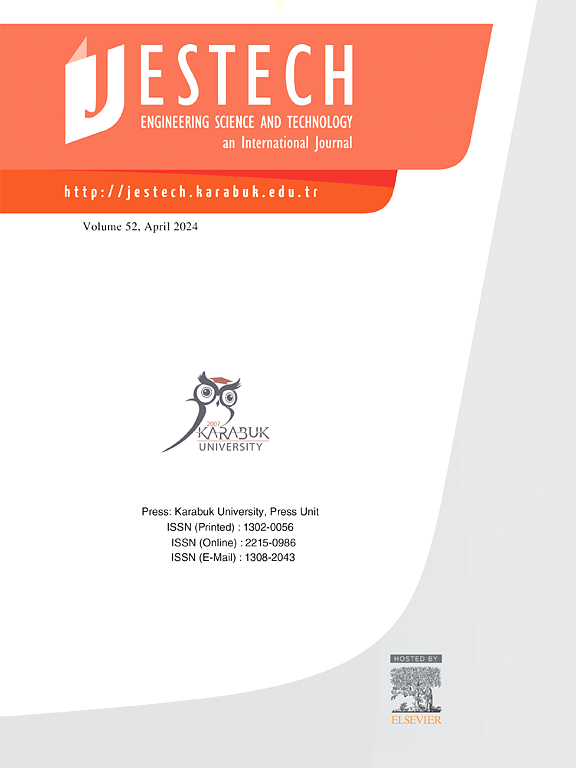Optimizing intelligent residential scheduling based on policy black box and adaptive clustering federated deep reinforcement learning
IF 5.1
2区 工程技术
Q1 ENGINEERING, MULTIDISCIPLINARY
Engineering Science and Technology-An International Journal-Jestech
Pub Date : 2025-02-01
DOI:10.1016/j.jestch.2025.101951
引用次数: 0
Abstract
In the context of user-side demand response, flexible resources in buildings such as air conditioners and electric vehicles are characterized by small individual capacities, large aggregate scales, and geographically dispersed distributions, necessitating integration by intelligence buildings (IRs). However, the optimization scheduling of IR clusters often involves detailed energy consumption data, posing privacy issues such as revealing household routines. The traditional aggregator-IRs bi-level architecture typically employs centralized or game-theoretic strategies for optimization scheduling, which struggle to balance efficiency and privacy simultaneously. To address this issue, this paper proposes a bi-level optimization scheduling strategy that balances efficiency and privacy. First, deep reinforcement learning models are established for both the aggregator and the IRs to address efficiency. Then, the trained demand response models of the IRs are encapsulated into strategy black boxes and uploaded to the aggregator’s deep reinforcement learning model. Throughout this process, the aggregator remains unaware of the user-side data, thus protecting user privacy. Additionally, considering that training IR strategy black box models is a parallel and similar process, this paper introduces the paradigm of federated learning to reduce learning costs and improve training efficiency on the IRs side. Furthermore, an adaptive clustering federated deep reinforcement learning method is proposed to address the heterogeneity of the IRs. Finally, case studies demonstrate the feasibility and effectiveness of the proposed method.
基于策略黑盒和自适应聚类联合深度强化学习的智能住宅调度优化
在用户侧需求响应的背景下,空调、电动汽车等建筑中的灵活资源具有个体容量小、总体规模大、地理分布分散的特点,需要智能建筑进行整合。然而,IR集群的优化调度通常涉及详细的能源消耗数据,带来隐私问题,例如暴露家庭日常事务。传统的aggregator-IRs双层体系结构通常采用集中式或博弈论策略来优化调度,难以同时平衡效率和隐私。为了解决这一问题,本文提出了一种平衡效率和隐私的双层优化调度策略。首先,为聚合器和IRs建立深度强化学习模型以解决效率问题。然后,将训练好的需求响应模型封装到策略黑盒中,并上传到聚合器的深度强化学习模型中。在整个过程中,聚合器始终不知道用户端的数据,从而保护了用户的隐私。此外,考虑到IR策略黑箱模型的训练是一个并行的、相似的过程,本文引入了联邦学习的范式,以降低学习成本,提高IR侧的训练效率。在此基础上,提出了一种自适应聚类联合深度强化学习方法。最后,通过实例验证了该方法的可行性和有效性。
本文章由计算机程序翻译,如有差异,请以英文原文为准。
求助全文
约1分钟内获得全文
求助全文
来源期刊

Engineering Science and Technology-An International Journal-Jestech
Materials Science-Electronic, Optical and Magnetic Materials
CiteScore
11.20
自引率
3.50%
发文量
153
审稿时长
22 days
期刊介绍:
Engineering Science and Technology, an International Journal (JESTECH) (formerly Technology), a peer-reviewed quarterly engineering journal, publishes both theoretical and experimental high quality papers of permanent interest, not previously published in journals, in the field of engineering and applied science which aims to promote the theory and practice of technology and engineering. In addition to peer-reviewed original research papers, the Editorial Board welcomes original research reports, state-of-the-art reviews and communications in the broadly defined field of engineering science and technology.
The scope of JESTECH includes a wide spectrum of subjects including:
-Electrical/Electronics and Computer Engineering (Biomedical Engineering and Instrumentation; Coding, Cryptography, and Information Protection; Communications, Networks, Mobile Computing and Distributed Systems; Compilers and Operating Systems; Computer Architecture, Parallel Processing, and Dependability; Computer Vision and Robotics; Control Theory; Electromagnetic Waves, Microwave Techniques and Antennas; Embedded Systems; Integrated Circuits, VLSI Design, Testing, and CAD; Microelectromechanical Systems; Microelectronics, and Electronic Devices and Circuits; Power, Energy and Energy Conversion Systems; Signal, Image, and Speech Processing)
-Mechanical and Civil Engineering (Automotive Technologies; Biomechanics; Construction Materials; Design and Manufacturing; Dynamics and Control; Energy Generation, Utilization, Conversion, and Storage; Fluid Mechanics and Hydraulics; Heat and Mass Transfer; Micro-Nano Sciences; Renewable and Sustainable Energy Technologies; Robotics and Mechatronics; Solid Mechanics and Structure; Thermal Sciences)
-Metallurgical and Materials Engineering (Advanced Materials Science; Biomaterials; Ceramic and Inorgnanic Materials; Electronic-Magnetic Materials; Energy and Environment; Materials Characterizastion; Metallurgy; Polymers and Nanocomposites)
 求助内容:
求助内容: 应助结果提醒方式:
应助结果提醒方式:


